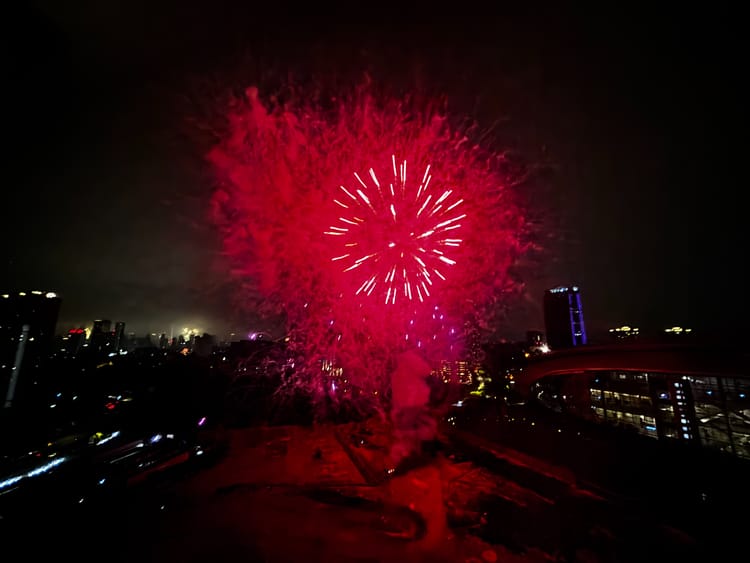DPS 周刊 207 - Breakneck

上个月 Dan Wang 关于中国的专著 Breakneck 终于正式上市了。这本书的主要论点是:中国是工程师治国,而美国是律师治国;两者其实有很多相似之处,如果可以相互学习,那么未来将会变得非常不一样。
The future would be better if China could learn to build less, while the United States learns to build more. I've come to realize that there are many ways that China and the United States are inversions of each other.
As these countries grow apart, they are going to have to do something difficult: The United States will have to regain all the muscle it has lost for building public works as well as manufacturing capacity, and China will have to empower consumers by getting over its fear of making people lazy.
Chinese and Americans are pragmatic: They have a get-it-done attitude that occasionally produces hurried work. Both countries are full of hustlers peddling shortcuts, especially to health and to wealth. Their peoples have an appreciation for the technological sublime: the awe of grand projects pushing physical limits. American and Chinese elites are often uneasy with the political views of the broader populace. But masses and elites are united in the faith that theirs is a uniquely powerful nation that ought to throw its weight around if smaller countries don't get in line.
Beijing will never be able to draw on the best feature of the United States: Embracing pluralism and individual rights. The Communist Party is too afraid of the Chinese people to give them real agency. Beijing will not recognize that the creatives and entrepreneurs it is chasing into exile are not the enemy. It will not accept that their creative energy could bring as much prestige to China as great public works.
But there are still some things that the United States can learn from the engineering state. Although the creative class wants to rùn, the material benefits for most of China's population are widely spread.
Dan Wang 是一位非常精通中国的写作者,他出生于云南,小时候就随父母移居加拿大,然后又搬到美国。成年后,又因为工作“回到”中国,先后在香港,北京和上海生活。
Both of my parents were born in Kunming, the capital of southwestern Yunnan province. Yunnan folks are reputed to be laid back, more eager to sit over tea and chat through the afternoon rather than drive themselves too hard. Not that there's much to drive toward. The city was a backwater when my parents left and remains lackluster today.
My mom, Rachel, and my dad, Frank, each have one parent with deep roots in Yunnan and one parent brought there by the war.
My dad's father, my Yeye, was born into Yunnan's most prominent merchant family. The Zhu Family Gardens was Yunnan's largest residence, with gardens so splendid that it would have fit in among the charmed estates of Suzhou. Near the end of the Qing dynasty in the nineteenth century, the family patriarch oversaw a business focused on the mining of tin and copper, expanding (as successful merchants did at the time) into selling tea, distilling spirits, producing silk, and possibly partaking in the opium trade-although my relatives have been a bit vague when I ask them about this point.
And my mom spends her time at home, glad to be free of laborious jobs. Their house in Pennsylvania is filled once more with books, like it was in Yunnan. On weekends they walk the Pennypack Trail or visit parks like the Delaware Water Gap. Since I worried about leaving them alone as an only child, I brought home a dog while I was in college, which gave them joy for years. Going to Costco is a weekend ritual for them like it is for many immigrant families. They've even taken up pickleball. After they naturalized as citizens, both of them cast votes in the 2024 presidential election.
The biggest beneficiary of my parents' emigration is me. I have no idea what I would be like if I had grown up in Kunming rather than Ottawa. My parents tell me that the children of their classmates have mostly not found jobs that give them much meaning, not even the talented folks who made it to Beijing or Shanghai. My three cousins, who are in their twenties, all live at home with my aunts and uncles, because they don't want to spend their meager paychecks on rent. If my parents never emigrated, they still might have been able to send me to an American university. In fact, they would probably have been able to afford it more easily. But I certainly wouldn't have been able to do the sort of work I'm proud of, like writing this book.
之前曾经连续七年,Dan Wang 每年写一封年度之信,记录他对中国的观察。我们陆续都分享过:
2017 Letter: Daily Productive Sharing 920 - 2017 letter
2018 Letter: Daily Productive Sharing 925
2019 Letter: Daily Productive Sharing 380 - Observation of China in 2019
2020 Letter: Daily Productive Sharing 375 - Dan Wang's Observation About China in 2020
2021 Letter: Daily Productive Sharing 370 - An Observation of China in 2021
2022 Letter: Daily Productive Sharing 915 - Letter of 2022
2023 Letter: Daily Productive Sharing 910 - Letter 2023
Breakneck 其实是这些观察的沉淀,Dan Wang 在这本书里更系统地分析了中美的异同,辅以翔实的细节,所以让人读起来就放不下。这些细节和他之前在中国的生活不无关系,作为一家智库的分析师,他时常需要采集第一手数据,这就需要他深入各地,不只是大城市,也包括不少边远山区:
It was over this long ride that I started to realize how an examination of China's problems throws US problems into stark relief. Each time I left Beijing and Shanghai to enter more remote parts of the country, I was astonished by how even China's poorest provinces have better infrastructure than America's richest. The chief feature of the engineering state is building big public works, no matter the financial or human cost.
That feeling contributes to a blind spot that Americans have for China. People unable to appreciate the benefits of material improvements also don't understand how it produces pride and satisfaction.
他经常接触中国的企业家,所以经常会记录这些民间智慧:
He put down his teacup and looked at me. "Chinese companies decided that making money is their core competence, therefore they go and make masks, or whatever else the market needs."
他的不少比喻非常精妙,比如把中国的经济比喻成天津的网红图书馆;把重庆称之为 hydropunk,源自 cyberpunk 一词,又结合了重庆丰富的水资源;把解封后的上海比喻成平壤。
I sometimes think of Tianjin's library as a metaphor for China's economy: great hardware that looks impressive from a distance, not filled with the softer stuff that actually matters. Tianjin could have focused on filling its amazing skyscrapers with better businesses. Instead, it could only build more hollow shells, while it gained considerable debt.
Everything is bigger in Chongqing. It is raucous, full of unexpected sites, a city that teems. With its Blade Runner aesthetic, Chongqing is the embodiment of cyberpunk-or more aptly given its rivers, hydropunk.
After zero-Covid, Shanghai is a little bit less like the Paris of the East, a little bit more like another Pyongyang. The city remains amazingly beautiful, with so much art deco, neoclassical, and modernist architecture. Its pleasures continue to deepen, with entrepreneurs competing ferociously to introduce new ways to have fun. But it also has long-term wounds that are not so visible. Owen, who is still in Shanghai, told me that lockdowns no longer come up often in conversation. "But when people get really drunk, it's still something that people get worked up about."
中美经济合作最显著的例子就是 iPhone 的诞生,Dan Wang 整整花了一章讨论了这一成就。其中一些细节非常深入,比如美联航在2019年有上海和旧金山对飞的航班,而 Apple 每天都包下了五十张商务座的机票。
When Steve Jobs announced the iPhone in 2007, there was no more natural place than Shenzhen for mass production. It had already scaled up manufacturing of the iPod there a few years earlier. Apple decided that Shenzhen was the city to make the boldest product that Jobs had conceived. The iPhone has become one of the rarest sorts of consumer products-both ubiquitous and coveted as a status object. It is also the crowning success of the trade relationship between two countries, in which American inspiration and marketing savvy met China's millions of workers, managed by contract manufacturers like Taiwan's Foxconn, to make state-of-the-art electronics. It wasn't easy to organize a workforce to assemble thousands of components into the most complex consumer product the world has ever known. Mastering this feat propelled Apple to become the first trillion-dollar company.
The company's analysts expected recruitment to last nine months to hire that many engineers in the United States, In China, they were able to do it in two weeks. A large pool of good labor increases the speed of design and production cycles. As Tim Cook once said, "In the US, you could have a meeting of tooling engineers and I'm not sure we could fill the room. In China, you could fill multiple football fields."
Taiwanese managers tell me. "How can they possibly put together something as intricate as an iPhone?" It's hard to say what was more repetitive: studying Xi's speeches or doing electronics assembly. Both are mind numbing, but assembly work caused greater suffering.
"There are always new components or processes that a new design requires, like a certain type of adhesive or a screw of a slightly different size." Therefore, Apple constantly had to scramble to find suppliers on short notice. "Almost always," the engineer continued, "we found someone in Shenzhen by asking a guy who knows a guy whose cousin might be able to produce a few hundred thousand new screws."
It's fully appropriate to call Shenzhen the "Silicon Valley of hardware." As in the stretch from Palo Alto to San Jose, Shenzhen is full of boring office parks along highways in a beautiful natural setting. And friends would tell me that Shenzhen, as in Silicon Valley, is a great place to found a start-up. A group of people would discuss an idea over dinner, divide up the tasks, and get to work the next morning.
In 2019, United Airlines made a promotional banner about how valuable Apple was to its business. United wrote that Apple booked fifty business-class seats daily from San Francisco to Shanghai, from which the airline made $35 million each year. That's over eighteen thousand business-class seats on one route.
Apple is making immense efforts to cultivate production sites in Vietnam and India. But it is going to be gradual, since the infrastructure and labor in these countries will take a while to catch up. According to Apple's most recent supplier report (released in 2023), 156 of its top 200 suppliers have manufacturing sites in China. Seventy-two of them are in Shenzhen's province of Guangdong, which is as many as there are in the United States, Vietnam, and India combined.
Huaqiangbei electronics market, where vendors were selling more cosmetics than cables and capacitors. Hardware has become too commoditized a business, forcing the entrepreneurial folks at Huaqiangbei to turn their attention to China's growing demand for skin-care products. It's hard to imagine eye creams are in line with Xi's goal to resist deindustrialization. And yet, there it is, in a trend that a state media headline captured as "Huaqiangbei Trades Computer Chips for Lipsticks."
类似的合作还有 Tesla 。也正是这样的合作,产生了鲶鱼效应,不仅盘活了上下游产业链,也使得中国的本土企业得以成长,从而与 Tesla / Apple 一拼上下。
And Tesla made investments in China's tooling ecosystem that other automakers exploited to produce better cars. BYD benefited as well, reporting record profits in 2023 and becoming the world's largest electric vehicle maker. And even the Communist Party's main newspaper praised how Tesla produced the "catfish effect" for Chinese firms.
Market competition tends to lower prices and raise quality. Apple and Tesla have made a huge effort to train its Chinese workers to manufacture their products-and earned fabulous sums of money by doing so.
Low-wage ecosystems like Shenzhen became a giant magnet for US process knowledge. Beijing made a deliberate decision not to be like Japan, which kept its market limited to American companies; rather, China mostly welcomed foreign manufacturers to train its workers. It is some sign of China's economic openness that so much of its exports are driven by Apple and Tesla, while Japanese exports have been driven almost entirely by its own companies. After it built up a critical mass of process knowledge, however, Shenzhen became as much an innovator of new electronics as an implementer of American ideas. It's not clear to me that it was part of Beijing's grand strategy to rely on American companies to become a manufacturing leader. But in some cases, the state understood that's what they were doing. Beijing did something unprecedented for Tesla in 2018: It allowed the company to fully own its plant in Shanghai.
通过这两个例子,Dan Wang 解释了中国的产业集群模式:通过市场换技术的模式引进外国先进技术并加以吸收,同时,因为这些先进技术需要下游产业链的配合,所以这些大厂周围往往衍生出一系列产业链。因为低廉的劳动力,使得这些产业链得以存活。而下游产业链的成熟,往往又催生出本土的上游厂商进行整合,从而造就了小米,比亚迪之类的企业。
China took up a lot of the dirty industries that the United States was happy to get rid of. In some cases, literally: Rare earth metals are not really rare. Processing them, however, demands enormous amounts of energy and water while spewing carcinogens into the atmosphere. Few parts of the Western world have the stomach for processing rare earth metals, which is why China controls this supply chain. Most forms of low-end manufacturing aren't as bad as that, but the United States was just as willing to let them go, with little understanding of how much it would hurt the country.
A focus on manufacturing gives China another advantage in technological competition with the United States. It can simply wait for American scientists to do the fundamental research before Chinese companies take over the production. That is, in essence, what happened with the solar industry. Bell Labs invented the first solar cell, and German companies produced solar production equipment. Beijing's designation of solar as a "strategic emerging industry" invited Chinese companies to rush into this industry. Chinese companies bought German equipment and competed fiercely to make the most efficient solar cells. By the mid-2010s, Chinese companies figured out how to make all the German tools, as well as the entirety of the solar value chain. The plunge in solar power costs over the last decade has been driven less by breakthroughs in science-which is the United States' strong suit-than by efficient production, which is China's strength.
That is what the engineering state is about. It likes to build not just public works but also manufacturing capacity. The engineering state resists economists as easily as lawyers. Economists may cite David Ricardo's theory of comparative advantage as a reason to permit production to move away. The engineering state declines, aghast at losing manufacturing because it's somehow cooler to be in services.
The reality is that the United States will never again be a bigger manufacturer than China. Its much smaller population, the higher wage and standard-of-living expectations, and the dollar's status as a global reserve currency make that harder. On a practical level, it is difficult to imagine that Americans can tolerate the work habits of people in Shenzhen or Henan: working on assembly lines for eight hours a day, eating at cafeterias at designated times, crammed six to a dorm room at night. Manufacturing workers in the Midwest like to drive their pickup trucks home.
这种模式并不是简单的一句 MAGA 口号就能复制的,如果只是要求 Apple / Tesla 这样的上游厂商搬回美国,而没有成熟的下游产业链配合,这种复制只是空中楼阁。
Everything starts from the recognition that something has gone quite wrong in US technology. Too many people have argued away the strategic importance of manufacturing. And the solution has to involve reconstituting its communities of engineering practice that prioritize process knowledge. It means attempting to build up every segment of manufacturing: training workers and creating incentives for manufacturers in order to relearn mass production.
When I worked in Silicon Valley, people liked to say that knowledge travels at the speed of beer. Engineers like to talk to each other to solve technical problems, which is how knowledge diffuses. They are poached by rival firms or sometimes rival countries. Over the longer run, it's difficult for countries to monopolize their dominance over.
The United States does want to re-create Shenzhen's success. But it has had, at best, a surface-level understanding of its success. Silvia Lindtner, a professor at the University of Michigan and my wife, has spent more than a decade studying Shenzhen's technology ecosystems. In 2015, the Austrian government asked her how to create a Shenzhen in the Alps; in 2016, the White House invited her to present on how the United States might learn from the success of Shenzhen. She has felt, as I do, that these agencies misunderstood the point of Shenzhen. They were still more interested in individual inventors rather than understanding it as a community of engineering practice. The obsession with invention has clouded Silicon Valley's ability to appreciate China's actual strength.
中国的工程师治国的另一体现就是独生子女政策,没错,提出这一计划的宋健是研究卫星和火箭的科学家,而不是人类学家活着统计学家。而计划生育的执行也是完全的工程师思路:
In 1982, China was finally organized enough to undertake its first census since 1964. Deng and Chen regarded the results with glumness. China's population increased by three hundred million in those eighteen years, becoming the first country ever to surpass one billion people. The leadership felt even more convinced of the need for population control. The Communist Party had declared family planning a "foundational national policy" and wrote it into the constitution, removing it from the realm of debate and empowering Qian's most ruthless instincts.
In 1983, Qian mobilized party and state offices at every level for a big push. That year, the state sterilized sixteen million women and carried out fourteen million abortions. By comparison, in the prepolicy year of 1975, the state performed only three million sterilizations and five million abortions.
By the early 1990s, ultrasound machines were in widespread use, permitting parents to engage in sex-selective abortions. That meant fewer killings after birth. But it didn't stop China's official sex ratio at birth to reach 120 boys born for every 100 girls in 1999. That ratio has since declined to 111 boys to 100 girls. In the intervening decades, however, demographers estimate that around 'forty million women are "missing."
尽管人们通常会将中国的各种问题归结于“人太多”,比如缺粮,比如福利不够,但这些问题的实质是分配不均,是计划经济。好笑的是,倡导改革开放的邓小平,却把计划经济的思路放到了人口管理上 -- 计划生育。更好笑的是,步入二十一世纪之后,突然把计划生育一棍子打倒,鼓励生育也就算了,现在又开始限制结扎。真正地把政治带到子宫里。
There's no question that Chinese people experienced severe shortages of everything prior to the adoption of the one-child policy in 1980. But these shortages were the result of the socialist planned economy. This system was characterized by agricultural collectivization, an emphasis on heavy industry, and lavish spending on national defense, leaving little left for consumer production. Consumer shortages eased when Deng moved China away from socialism. It's unclear if Deng was aware of the irony that he was attempting to impose planning on the population while he was trying to dismantle planning for the economy.
Rather than being totally fixated on women, the engineering state is now also thinking about men. State media has started to fret about leftover men too. The tens of millions of Chinese men who will never be able to find wives may become a threat to public safety, who could, in the words of one university researcher, "be driven to kidnap women or become addicted to pornography." Men have also taken to social media to complain that it's getting too difficult to obtain a vasectomy.
Some hospitals turn men away from vasectomy unless they can prove they already have children. National health yearbooks reveal a breathtaking collapse in vasectomies performed in China. They fell from 181,000 in 2014 (the start of Xi's rule) to fewer than 5,000 in 2019. In the new era, men are getting a taste of birth planning too.
James C. Scott called weapons of the weak. The most straightforward means of resistance was to escape to a different village. A mother might return with a newborn and hope for leniency with a fait accompli. But it was a risky strategy to produce an out-of-plan child. Many jurisdictions did not allow them to have the schooling or medical benefits available to an authorized birth.
Since China's minority groups enjoyed some leniency to have more than one child, people discovered Tibetan, Dai, Miao, or some other such ancestry that they had previously forgotten to disclose to authorities. After Beijing loosened the policy permitting families to have a second child if their first was disabled, the writer Peter Hessler discussed the story of a family that rented a disabled child they claimed was theirs in their application for a second birth permit (which was successful).
In 2025, adult diapers are expected to outsell baby diapers. China has already grown old before it grew rich: When Japan's population started to decline (fourteen years before China's), it was more than twice as rich.
For decades, the Politburo has had at least one woman serving in the twenty-five-member group. She was often given the party's toughest tasks: Wu Yi managed negotiations for acceding to the World Trade Negotiation and handled the 2003 SARS outbreak; Sun Chunlan oversaw the enforcement of lockdowns related to Covid. Both Wu and Sun stood out for their abilities in a field of sometimes mediocre men. For his third term, Xi shrank the Politburo to twenty-four members, dropping the one space that had been given to a woman. By locking women out of China's political leadership, Xi might well have been trying to set an example.
作为“动态清零”的亲历者,Dan Wang 花了一章记述了这一经历,特别是上海封城。一开始他还庆幸,与当时的女友现在的太太 Silvia Lindtner 一起在法租界享受生活,一宣布封城,他抢到机票,逃离上海,跑到云南 -- 他的故乡生活了大半年。
When Li Wenliang died, foreign commentators bandied about the term "Chernobyl moment" to describe the greatest threat to the Communist Party's legitimacy in decades. Three months later, Xi declared that China had "turned the tide on the virus." Subsequently, while the miseries of Covid deepened in other countries, People's Daily declared that pandemic controls were a demonstration of the superiority of China's socialist political system.
Only a country ruled by engineers could be so single-minded about pursuing a number. Since the early days of the pandemic, Chinese officials became obsessed with two numbers: new infections and the reproductive rate of the virus. The engineering state did everything it could to stomp them down.
What is a difficulty for government administration and industrial growth is often a positive for personal liberties. The mountains of Yunnan protected local peoples from the state-produced famines in the Great Leap Forward and the harangues of the Red Guards during the Cultural Revolution. That's why Yunnan might be China's freest region. It is farther from the country's core, and unlike in Xinjiang or Tibet, the state hasn't treated its ethnic populations to its most stringent controls.
I picked up the idea of the engineering state in Yunnan's mountains. The government was able to treat people as chess pieces to move around (or hold still) in Shanghai, while failing to do so in more remote areas. A glimmer of the lawyerly society came into view as well. One of the most-shared essays during the lockdown was a commentary by Tong Zhiwei, a constitutional law professor in Shanghai, who pointed out that the city's lockdowns had no legal basis. The government's response to Tong's legal arguments was to censor his essay and erase his social media profile. What did it matter that keeping twenty-five million people indoors over an undefined period lacked legal authority? Good luck to anyone attempting to go to a courthouse to file a suit.
My friends felt like they were taken twice to the cleaners: first, when they couldn't stockpile essential supplies following the surprise lockdown announcement and, later, when they couldn't stockpile any medicine. What was the point of the April-May lockdown, they ask, when it was all given up just nine months later? Some of the older people said that the lockdown wasn't the worst thing to happen to them, pointing to the Cultural Revolution. Younger people born after 1990, however, who had known only rising prosperity, had their first real taste of the disaster that could be inflicted by the engineering state.
The Shanghai government had promised to make food deliveries. It started out okay: Everyone I know in Shanghai received a handful of packages featuring a welcome but random assortment of fruits, vegetables, and meat. But government deliveries quickly ran out of steam. On April 5, when the lockdown was supposed to end, Shanghai announced that it would need to be extended. That's when food concerns heightened. By mid-April, nearly all of my friends had experienced at least a few days of food insecurity. Two sets of parents told me that they forfeited their own meals to save food for their young children.
The food supply chain broke down for several reasons. One of them was that the state made it difficult for truckers to bring food into Shanghai, fearing that they could bring the virus across vast distances. To cross a province, truckers often had to wait in lines, remaining in their cabs until their Covid test results were available. One viral video showed a driver holding up bottles of his own excrement because traffic control would not permit him to exit. He exploded in frustration that the controls made him feel like an "animal in captivity." These strictures drove many to quit. In mid-April, trucking activity in Shanghai was only 15 percent of its normal level.
Neighbors were able to coordinate help for each other in this WeChat group, even elderly ones (though they might be digitally represented by a son or daughter who wasn't living with them). The chat's most important function was to arrange group buying, which Owen accomplished by placing bulk orders directly from a wholesaler.
One day Owen found himself craving good bread, a luxury that his neighbors wouldn't have agreed to. He bought some from a home baker across town, at $40 a loaf.
One video managed to achieve censorship escape velocity. Someone (or a group of people) collated a chronological montage of audio clips into a video titled "Voices of April." The six-minute clip included Wu Fan's remark that Shanghai was too important to lock down; shouts of people demanding food; a man pleading for his sick father to have medical treatment; exhausted officials saying there was nothing they could do. "Voices of April" dominated my WeChat feed for a few days. People put more effort into sharing that video than anything else in an attempt to circumvent censorship. They even put it on the block chain, where it will remain for posterity.
By late April, most of my foreign friends-especially those with children-departed China, a few for good. Pricey plane tickets were the least of their concerns. To depart from their apartments and get to the airport, people had to sign affidavits swearing not to return to their residence. A taxi to the airport that costs $30 in normal times shot up to $300 because only a few cars and buses were permitted to pick up passengers.
Food logistics improved through May, such that Morgan Stanley was able to do what an American bank does: deliver extravagant gifts to select clients. One of my friends received such a package and told me that it included a crayfish salad, which felt like an absurd luxury at that moment.
Xi Jinping declared controlling the coronavirus to be a people's war, a Maoist term that promised to smash imperialist invaders with guerrilla maneuvers. The state marshaled hefty men, dabai, dressing them in ill-fitting white uniforms and arming them with temperature scanners to check whether people entering buildings had a fever.
I felt baffled and angry that winter. Covid-19 was China's third epidemic in three decades, exploding in exactly the same pattern as the previous two. In the 1990s, Henan province suffered an AIDS outbreak after blood banks reused needles and commingled diseased blood with healthy blood; the government spent years silencing whistleblowers in this slower-moving epidemic before finally confronting the problem. In 2003, officials in Beijing and Guangdong attempted to suppress news of the SARS outbreak before moving decisively to control it.
A year before the coronavirus spread from Wuhan, China's top disease control official, George Gao, offered a boast: "I am very confident to say that SARS-like outbreaks will not occur again because the infectious disease surveillance system network of our country is well established." Gao had it right when he said that China had developed a technically impressive disease surveillance system. What he failed to factor in were the weaknesses in China's political system, in which local officials prevented health workers from reporting the disease. Rather, Wuhan officials directed police to punish medical whistleblowers. And so China faced its worst public health crisis yet.
AN HOUR AFTER Shanghai's surprise lockdown announcement, Silvia and I purchased airline tickets to Yunnan, the mountainous province in China's southwest where my family is from. Neither of us trusted that the Shanghai lockdown would last only eight days. More important, both of us were able to work remotely. We had been discussing whether to depart from Shanghai since the early day we saw the dabai besiege the Embankment Building. The lockdown announcement was a good prompt for organizing our departure. When Silvia and I left, our flight was one of a dozen that hadn't been canceled that day. We were lucky. Cities across China had already refused to allow flights from Shanghai because it was the center of the omicron outbreak.
Imagine the comedy romp that could be produced about colleagues who used to despise each other learning to come to terms while they were stuck for two weeks, unable to wash, inside their offices. Or the relationship drama between a couple at Disneyland, attempting to resolve their problems as they remained unable to depart from the happiest place on earth. Unfortunately, the state has suppressed any official memory of Shanghai's lockdown itself. The engineers want people to forget, not to poke fun at this experience.
I've asked several friends why they thought Shanghainese did not protest. They wondered that too. The main reason they proposed was that most Chinese were genuinely fearful of catching the virus. They had listened to too many government reports of how virulent it was and few reports from Western commentators that downplayed its seriousness. China's health authorities had adopted a gradualist approach to layering on its measures, such that the zero-Covid strategy did not feel so strange until later. And no one imagined that the lockdown would last as long as it did. People might have protested earlier if they knew that the lockdown would last eight weeks, but the city's initial announcement of an eight-day "pause" forestalled dramatic action.
But Shanghai was tense after the vividness of an eight-week lockdown. Nobody knew how Xi planned to exit from zero-Covid: Wasn't everyone going to catch the virus anyway, potentially meeting it with a domestic vaccine that was less efficacious than what the American government was giving out? Shanghai tightened control over movement restrictions after it reopened in June, announcing that such measures were necessary to prevent another lockdown. For a while, people continued to accept them.
Shanghai's lockdown extended far beyond that date. Case counts exploded while the city was in its quiet period. Instead of lasting eight days, the lockdown lasted eight weeks, finally reopening in June. I often think about the China Daily headline "Shanghai Has No Plans for City Lockdown." It could be read in two ways. I first understood it as a denial that the city would impose a lockdown. I understand it now as a totally accurate explanation of what happened next: The city had made no plans for confining twenty-five million people to their homes for eight weeks.
By late March, a sense of dread pervaded Shanghai. On a particularly eerie day, Silvia and I heard from three separate friends within the span of an hour that they were no longer able to leave home for three days: A neighbor had been a close contact to a positive case.
In December 2021, we began hearing about the omicron strain of the virus, which scientists told us was so much more transmissible than earlier variants. I wondered about omicron's effect on China in my annual letter published on the last day of that year. "I worry that it's so transmissible that the government will ... implement lockdowns far more severe than anything it has done to this point." On Twitter, I was more flip: "I prepared three items at home to survive a potentially severe lockdown: mooncakes (high-caloric and long-storing); a bike with a trainer (to cycle through the metaverse); and the Hebrew Bible (Robert Alter translation)."
In 2020, when I asked my parents whether I should visit them in Pennsylvania, their reply was not very typical for Chinese: they demanded that I didn't visit. Much better to stay in China, my mom told me, than Trump's America. They were in good shape, and I was glad they didn't need me there.
I didn't dread the virus. I dreaded only the process of reentering China if I departed. One of the core tactics that China used to keep out the virus was to shuttle everyone flying to the country into government-designated quarantine hotels, in which a person would be unable to leave a small room for two or three weeks, depending on the jurisdiction.
So I spent my time inside China, doing things like riding my bike from Guiyang to Chongqing. In 2021, I read giant novels like Dickens's Bleak House and Tolstoy's War and Peace. I also met my now-wife Silvia, a professor at the University of Michigan who was taking a sabbatical at NYU-Shanghai. As an ethnographer of technology cultures, Silvia had lived in China and continued to stay engaged. The United States that Silvia departed in 2021 was still a distressed place, where few people were getting together for in-person contact.
My mom, Rachel, and my dad, Frank, each have one parent with deep roots in Yunnan and one parent brought there by the war.
我们已经开通了微信支付和支付宝支付,如果你想及时读到 DPS 的全文,不妨直接付费订阅:
关于支付的详情介绍,可以访问这一页面。
Recap
Scorr Jenson 说别再把它叫作“人工智能”了?称为“大语言模型(LLM)”要准确得多,但许多人已经懒得纠正,直接叫“AI”。
- Cory Doctorow 说得很到位:“我们离 AI 能真正取代你的工作还差得远,但已经到了 AI 销售员能说服你老板它能取代你工作的阶段。”
- 他知道这话可能让自己听起来像个老人,但要理解当下的 LLM,了解一点历史会很有帮助。
- 炒作周期的早期阶段,往往是由风险资本推动的。他们害怕错过任何一个爆发式增长的新技术,因此资金会迅速涌入。
- 移动技术经历了完整的炒作周期:在 2000 年代初达到顶峰,随后经历低谷,在几年的幻灭期后才于 2009 年左右重新起飞。
- 人们记住的是它最终超越了最初的“过度期望峰值”,却忘了它也经历过一次坠落。

Adam Tauman Kalai, Ofir Nachum, Santosh S. Vempala 和 Edwin Zhang 解释了为什么 LLM 中的幻觉问题始终难以解决:
- 大语言模型之所以产生幻觉,是因为标准的训练和评估流程更奖励“猜测”,而非承认不确定性。
- 幻觉指的是语言模型生成的似乎合理但实际上错误的陈述。
- 评估本身并不会直接导致幻觉,但大多数评估方式衡量模型表现时,鼓励了猜测而不是对不确定性的诚实。
- 可以把它想象成一次选择题考试:如果不会但乱猜,有时也能蒙对。
- 当模型的评估仅基于准确率时,它们更倾向于猜答案,而不是回答“我不知道”。

Joan Westenberg 问人们为什么会相信他们所相信的,他们总能给出一些理由。
- 观点是先出现的——由大脑通过模式匹配瞬间拼凑而成;而那些理由,是后来才被编造出来,用来合理化他们早已认定的信念。这就是“虚构合理化”(confabulation),它主导了我们大约 80% 的公共讨论。
- 当你接触到一条新信息时,还没等理性思考介入,你的大脑就会先运行一个快捷算法:我所属群体中那些地位高的人对此怎么看?
- 心理学家称这种现象为“虚构合理化”,即我们创造出听起来合理的故事,用来解释其实源自潜意识的决策或信念。
- 这些理由只是对一个早已注定结论的事后辩护。
- 我们所看到的绝大多数“观点表达”,其实都是部落式信号伪装成个人思考。

Simon Willson 认为 vibe engineering 已经日益成为现实,特别随着代码智能体(coding agents) 的兴起——例如 Claude Code(2025年2月发布)、OpenAI 的 Codex CLI(4月)以及 Gemini CLI(6月)。这些工具能够迭代代码,不断测试和修改,直到实现特定目标,大幅提升了 LLM 在真实开发问题中的实用价值:
- 在实际软件工程中高效地与大语言模型(LLM)协作,有一个不太被提及的真相:这其实是很难的。
- 越来越多经验丰富、口碑可靠的软件工程师开始同时运行多个智能体,并行解决多个问题,从而拓宽他们的工作边界。
- 自动化测试:如果你的项目拥有健全、全面且稳定的测试套件,这类智能体工具的效率会像“起飞”一样迅猛。
- 对于能循环迭代的智能体而言,测试优先开发(test-first development) 尤其有效。
- 提前规划:临时上手写点代码的过程,如果从高层计划开始,往往会更顺畅。

Kevin Kelly 预测,在不久的将来,作家们将会倒过来付钱给 AI 公司,以确保他们的书籍被纳入 AI 的教育与训练之中。
- 如果你的作品不被 AI 所认识与欣赏,它就几乎等同于不存在。
- 每本书的收益中,只有一半实际会流向作者,另 50% 被出版社拿走。
- 感到很荣幸,能成为那些用于训练我每天使用的 AI 模型的书之一。想到自己的思想可能通他过 LLM 的思维链条传递给数百万人,我甚至有点受宠若惊。
- 在 Bartz 诉 Anthropic 案中,判决结果认为:如果一本书的副本是以合法方式获得的,那么用于 AI 训练属于合理使用(fair use)。
- 用于教育 AI 的资料筛选,将成为决定我们是否信任并依赖这些 AI 的关键因素。

Gregory Gundersen 花了十年时间学习编程,他又不少感悟:
- 放慢脚步让他能够专注于真正的精通。放慢速度能让你有机会诚实地问自己:我真的理解了吗?
- “精通式学习”的核心,是忽略学习所需的时间,而专注于完全理解所学内容。
- 他的建议是,不要担心自己是否“有天赋”能成为好程序员。不要被“程序员”或其他标签困住。
- 初学者的心态对成年人尤其难得,但至关重要,因为评判会让你看不清事物本身。
- 直觉并非天生的理解,而是经过长时间努力后“消化吸收”的经验。

Cedric Chin 说要确保你在玩的是真正的游戏,而不是自己臆造出来、更加复杂的版本。
- 目标是赢得比赛,而不是为自己设定毫无必要的高门槛。
- 在柔道中,抓握(grip fighting)是出手前的铺垫。谁能持续获得更好的抓握位置,谁就能掌控比赛的节奏与形势。
- 在游戏世界里,“scrub” 指的是那些没有在真正为了胜利而战的人。
- Scrub 心态就是被自己设下的束缚所捆住,以至于永远不可能在游戏中变得真正优秀。
- Malone 的洞见在于,他可以让 TCI(Tele-Communications Inc.)以五倍盈利的稳健负债比例进行杠杆运作,再用利息支出与设备折旧作为税务屏障,抵消这家拥有垄断式现金流的有线电视公司的应税收入。

Eugene Yan 认为任何长期不亲自下场的 Principal(首席工程师),都很可能在为失败埋下伏笔(短暂抽身可以,长期脱离不行)
- 没有哪一种风格更重要,你需要找到最符合你优势的那一种。
- 到了这个层级,亲自写代码可能已不是你时间的最高效用。
- 你仍然应该写代码(保持与实际工作的联系),但你的核心职责已经转变为技术愿景、设计反馈、资源赞助、提供业务/产品/技术上下文、发现新问题、建立联系等。
- 即使你仍有 80% 的时间在写代码,你影响力最大的部分,其实是如何让所有人都变得更高效。
- 更准确地说,你现在是个兼职的“全能型选手”:产品、设计、工程、科研、测试、招聘、财务、文化……无一不沾。

Claude 刚刚发布了 Skills - 一种有组织的指令、脚本和资源集合,代理(agent)可以动态发现并加载这些内容,从而在特定任务上表现得更好:
- 与其为每个用例单独构建定制的代理,现在任何人都可以通过识别并共享自己的流程化知识,来用**可组合的能力(composable capabilities)为代理赋能。
- 最简单的情况下,一个 skill 就是一个包含
SKILL.md文件的目录。该 yaml 文件必须包含一些必要的元数据:name和description。 - 这些元数据构成了第一层“渐进式披露(progressive disclosure)”:它为 Claude 提供刚好足够的信息,让它知道在何种情况下应使用该技能,而无需将整个技能内容加载进上下文。
- 文件正文是第二层细节。如果 Claude 判断该技能与当前任务相关,它就会通过读取完整的
SKILL.md将技能加载到上下文中。 - 技能目录中还可以包含其他附加文件,并在
SKILL.md中通过名称引用它们。这些附加文件构成了**第三层(甚至更深层次)**的细节,Claude 只会在需要时才选择性地访问。

Kevin Kelly 在2014年写下这篇文章,十多年后的今天再来回顾这些,很多都变成了现实,他确实富有远见 -- 2014 年,是在互联网上开始做点什么的最佳时刻——历史上从未有过比现在更好的时机去发明新事物:
- 就在那之前,我注意到 abc.com 这个域名还没人注册。于是我在为 ABC 公司顶层高管做关于数字化未来的咨询演讲时,告诉他们应该让楼下最聪明的技术员赶紧去注册自己的域名。结果,他们没有。
- 现在回头看,仿佛一波又一波的“拓荒者”已经把所有可能的地盘都推平开发完了,只剩下一些最棘手、最难啃的角落留给今天的新来者。
- 如果我们能坐上时光机,穿越到 30 年后的未来,再从 2044 年的视角回看今天,我们会发现——到那时主宰人们生活的那些伟大产品,大多数其实都是 2014 年之后才被发明出来的。
- 2044 年的老前辈们还会告诉你另一件事:“你能想象 2014 年创业有多爽吗?”
- 那时的预期与门槛都很低,做第一个人很容易。然后他们会叹息道:“要是当年我们早点意识到一切都如此可能就好了!”

Devansh Batham 认为阅读能带来即时的满足感,几乎让你产生一种“自己已经理解了”的错觉,但其实并没有——你只是部分理解了你读到的内容:
- 他采用的是一种混合学习法:阅读 + 间隔复习 + 在掌握基础后直接跳到更复杂的主题。
- 学习的目标,是有意识地走进让自己感到不舒服的领域——在那里,阅读已不够,猜测也行不通。正是在这种不适中,学习曲线才会变得陡峭、也更有意义。
- 大脑只有在看够足够多的例子后,才能真正形成直觉与模式识别能力。
- 一定要记录一切——哪怕是未完成的实验、奇怪的 bug、或者失败的想法。
- 真正的多巴胺并非来自立竿见影的结果,而是来自那种缓慢的觉察:你的大脑现在已经能连接起那些曾让你困惑的概念了。

Amjad Masad 说世上没几件事比失败更让他恐惧,那种感觉糟透了,这也意味着他必须不断地练习如何不输。
- 除了死亡,几乎所有事情你都有机会东山再起。
- 首先,要知道死亡边界,反复思考最极端的下行场景,并把生存放在最高优先级。
- 他运营 Replit 八年,商业上一直没什么起色,但在现金流上从未进入红区,始终手握充足资金。
- 你几乎可以从任何困境中爬回来。
- 他们在教育和招聘领域的业务增长还不错,但那两个市场缺乏兴奋点,所以他们果断转向。

Every.to 最近分享了他们内部是如何使用 AI 工具进行开发的,每个人都有自己的偏好:
- Claude Code 是一位“友善型开发者”,擅长拆解问题并解释推理过程;Codex 则是“技术型开发者”,更字面、更精确,常常一次命中正确方案。
- 通过 Figma MCP 集成,Claude 可以直接接入 Figma 文件,读取设计系统中的颜色、间距、组件,并将其转化为可运行代码。
- 他每次提交代码后,会在一份“学习记录”中写下两行心得并存入云端,几天后形成可回溯的近期记忆,用于再次喂给 AI 工具。
- 他把一天分为一个大任务和若干小任务,刻意避免被 AI 建议带偏。
- 他使用自制的 AgentWatch,当某个 Claude Code 会话完成时会提醒他,从而能同时运行多个会话而不失控。

Joan Westenberg 说我们经常把认知上的清晰误当成了进步:
- 大脑在“理解了某件事”和“完成了某件事”时分泌的那点多巴胺是一样的。
- 理解系统、机制和底层原理确实能在我们最终行动时让行动更有效。
- 问题在于,一旦“理解”取代了行动,而不是为行动做准备,麻烦就开始了。
- 分析发生在抽象与无限可能的领域;行动发生在具体与约束的领域。
- 你漂亮的模型一接触现实,就会以你没预料到的十一种方式出错;这让以“自己总是对”为傲的人很难受。

Dion Lim 认为:人工智能不会“崩盘”,而会“燃烧”。像所有科技周期一样,大火会清理灌木、重新分配人才,并留下能支撑下一个时代的基础设施。
- 野火不仅摧毁生态系统,也维持其健康——清除扼杀新生的浓密灌丛,把养分归还土壤,为下一代森林的繁荣创造条件。
- 两场火都遵循相同的模式:过度增长 → 突然修正 → 随后复兴。
- 资本充裕——也许太充裕了。但人才?那才是稀缺资源。
- 野火不只是破坏生态,它还重塑生态。有的物种瞬间燃尽,有的顽强抗火,还有一些必须依赖火焰才能繁殖。
- 可燃的灌木有其存在意义——它吸引资本和人才,制造市场紧迫感;而当它燃烧时,这些资源又会回到土壤,供更坚韧的物种吸收。那些倒闭的 AI 外壳公司的工程师,将成为幸存公司的高级雇员。

Archive
本周的生产力日报集合就到此为止,如果你有什么建议,也欢迎留言告诉我们。如果想要收到最及时的推荐,不妨订阅我们的频道,或者付费解锁更多增值内容,我们下期见。
如果你喜欢的话,不妨直接订阅这份电子报 ⬇️


















Comments ()